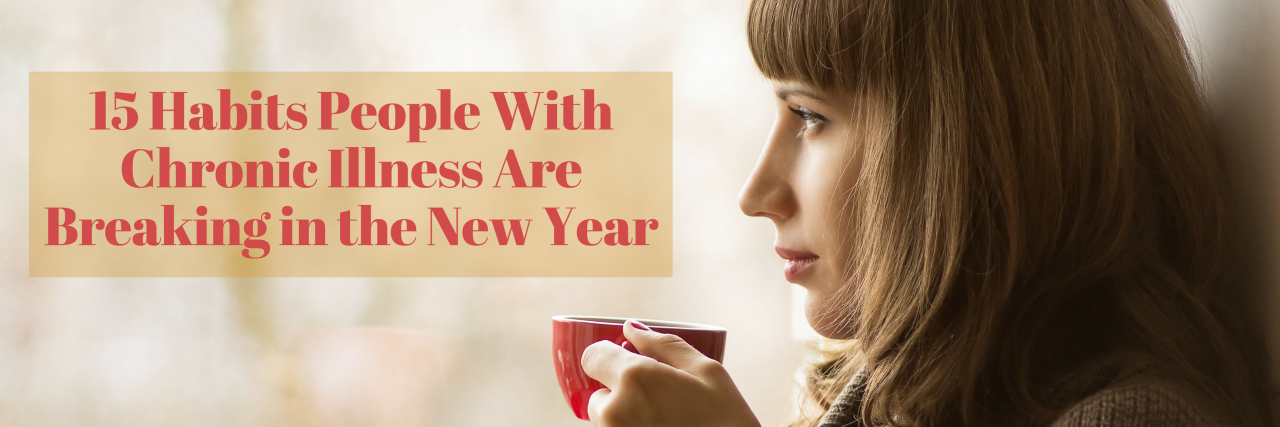The new year is often seen as a beginning, a fresh start, a time to adopt new habits to better yourself or your life in some way. Many of these resolutions often revolve around self-care and committing yourself to an activity – such as drinking enough water or writing in a journal – that will help maintain your physical and mental health.
Sometimes, however, what’s most necessary for your well-being is not to start a new practice, but to leave one behind. It can be easy to fall into unhealthy habits during the grind of daily life, whether you’re a full-time student, a full-time employee, or a full-time patient. Personally, I am often so focused on my physical health and managing my chronic illness that I completely neglect my mental health, allowing myself to develop unhealthy coping mechanisms to deal with the fears, frustrations and stresses of my medical issues.
Breaking bad habits is no easy feat – especially if you’re already feeling overwhelmed by your health struggles. But if you’re looking for some small ways to improve your physical and mental well-being, check out the habits our chronic illness community plans to leave behind in the new year.
Here’s what the community told us:
1. “I want to stop overdoing myself. I tend to keep going and push myself beyond my limits. If I could learn to do a little bit, then take a break, I think I could actually get more done without wearing myself out completely.” – Cassie D.
2. “Stop overextending myself to help others at the cost of my physical and mental health.” – Heidi M.
3. “I want to learn to focus on the positive things, no matter how small they are. I have been so weighed down with my disease that I forgot how to live.” – Kathy A. Z.
4. “Stop listening to people tell me about my health. If they’ve not been with me, seen my doctors, knows the ins and outs of my management I need to just say, ‘If you’re giving me encouragement, thank you. If you’re giving me medical advice, no thanks.’” – ママ ヲツツ
5. “Staying up way too late. I’ve gotten into the mindset that ‘since I’m not going to feel rested anyway, I might as well not go to bed.’ I really need to just start forcing myself to go to bed earlier.” – Bonnie P.
6. “My EDS makes exercise a challenge. So I haven’t done much of it since I had to quit working, which is weakening my heart and making my neurocardiogenic syncope much worse. I’m working on getting financial aid at my local YMCA so I can get in the pool for some low-impact exercise.” – Jessi S.
7. “Stop saying ‘I’m OK’ when really I’m not. I shouldn’t pretend to my friends and family I’m fine. If I’m having a bad day I should be honest and tell them.” – Georgina W. Q.
8. “Setting my worth and value on my own dreams and God-given gifts and talents, despite my health limitations, instead of upon the approval, disapproval, opinions and judgment of others. I want to live life out loud as the colorful, joyful, creative EDS zebra-corn I am!” – Cassandra P.
9. “Being more honest with myself in my limitations both for motivating myself to use the energy I have wisely and to know when to stop. Learning to say no without feeling bad about it is definitely a goal. It isn’t my fault I have this illness, why should I have to apologize?” – Katrina C. O.
10. “I’m hoping to get my sleep schedule on track, start exercising more, eating healthier and making sure I’m taking care of my teeth and showering. I always forget to.” – Ember H.
11. “Denying myself enjoyable things because I feel guilty. I often find myself saying that if I can’t do the housework then I shouldn’t be going out for drinks or painting my nails, etc. It’s necessary to have a balance.” – Kelly W.
12. “Easy and not easy. I need to eat better. I eat way too much fast food which I know is terrible for all my inflammation issues, but it’s fast, easy and cheap. I need to take time to meal prep and bring healthier meals to work.” – Megan C. D.
13. “I want to stop ‘complaining’ and focusing on all the things that hurt. Instead, I want to think about positive things, and have a more positive frame of mind.” – Rebecca J. M.
14. “Neglecting/falling off the wagon with self-care. I want to get back into supplementing, drinking enough water and electrolytes, getting good sleep, exercising, and finally do an elimination diet to see if I may have other food triggers… I’m also hoping to be healthy enough to work and get back to school this year.” – Kelliann G.
15. “I hope to learn to rest without guilt. To accept what is and put my health first.” – Christianne M.

